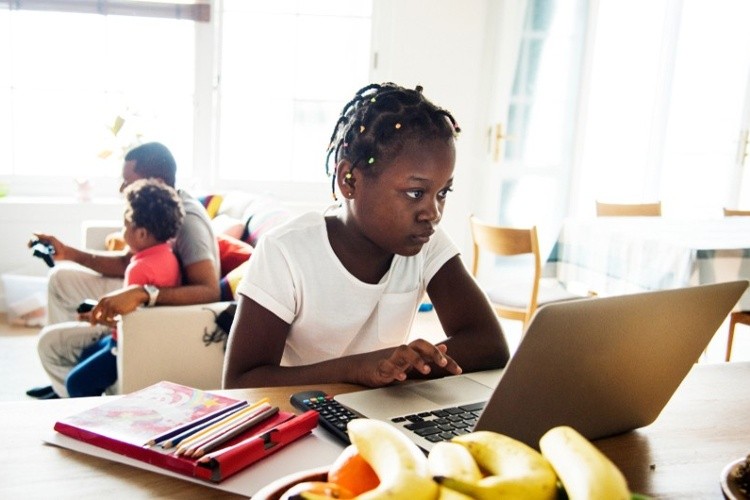Tele-schooling the K-12 Set
This article was originally published on March 24, 2020, by Columbia News.

After New York City closed its public schools to slow the spread of the coronavirus, Professor Shamus Khan found himself in discussions with colleagues and neighbors worried about how they would keep their children engaged and manage home schooling while doing their own jobs remotely. They didn’t want to park their kids in front of a TV.
“As a sociologist, my training is to think about social problems and find ways to solve them,” said Khan, chair of Columbia’s sociology department. “I realized there was a group of people with capabilities, like me and others without kids, who know how to teach, and a group of people with needs, which includes both kids and parents.”
He reached out to a colleague, Jennifer Lena, who had plans to offer a story hour to kids of a few friends via Skype. “We got to talking, and an idea started to gel,” said Lena, an associate professor of arts administration at Columbia's Teachers College. “Why stop at video chats? Why not reach beyond ourselves and build something that could help many more people?”
INTERESTED IN TEACHING?
From Arabic 101 and Ukulele Basics to Mindfulness
The result is Youth Remote Learning, an online platform for K-12 students across the country who are on hiatus from traditional classrooms. The site, which opened its virtual doors on March 23, offers 70 courses designed to appeal to diverse age groups and interests taught by educators who are all volunteers.
The courses, which are grouped by grade level, topic and time slot, range from fun and practical, such as Ukulele Basics and Japanese or Arabic 101, to intellectually challenging. One course, for example, explores the queer, multiracial story of women’s right to vote and another tackles neurobiology and mindfulness strategies. For the youngest set, there are read-alouds, poetry jams and even a class to learn techniques for tying a friendship bracelet.
Khan, co-author with Jennifer Hirsch of a recent book, Sexual Citizens: A Landmark Study of Sex, Power and Assault on Campus, is teaching two sessions of “Ethnography of the Crisis,” one for middle schoolers and another for high school students. His course will guide students on a discovery journey to document and understand the effect of COVID-19 on themselves, their families and community.
Khan and Lena, author of the newly published, Entitled: Discriminating Tastes and Expansion of the Arts, never imagined that this would grow so quickly in just two weeks.
“Our initial plan was to launch with five classes,” Khan said. "But after putting the word out on Twitter that we were looking for educators, the response was incredible. Our post got hundreds of retweets, and we ended up with nearly 100 volunteers.”
Many who raised their hands were Columbia academics, but instructors from across the country also submitted ideas. Khan’s research assistant, Brian O’Sullivan, a Columbia College senior math and sociology major, helped build the website. As the project’s only paid employee, O'Sullivan will oversee the platform.
Connecting With Families Who Lack Tech Services
The organizers expect 500 to 1,000 students to sign up this week, the majority learning about the courses through word of mouth or social media. They’ll connect with instructors through online platforms, such as Google Meet and Zoom, which allow for video conferencing and two-way communication. Most courses run 30 to 45 minutes, and the goal is to keep class sizes to no more than 20.
The initiative is strongly committed to making the resource available to low-income families. New York City, which has closed its schools through April 20 and possibly for the school year, is working to find computers and provide Internet access for those households that lack the services, as are other communities and states around the country that have experienced school closures.
"We are working with several Latinx groups and organizations to get the word out to those in need,” Khan said. And last week, notices were sent to parents of students who attend P.S. 125, an elementary school in the Morningside Heights neighborhood near Columbia.
Lena and Khan hope that during a time filled with postponements, cancellations and altered routines, the classes will provide children with structure and community, as well as open them up to a new world of ideas.
“Some of my favorite courses in school were electives that allowed us to explore a new area of interest, build or repair something or engage in a practical response to a social issue,” she said. “There are dozens of classes on the list that I want to take.”
Family members are welcome to join their children online, but some independent learning is encouraged.
“By learning on their own, children develop confidence and the skills to be self-starters,” Khan said. “Plus, we envision the program as a way to give Mom and Dad an extra 30 minutes to do what they need to do.”